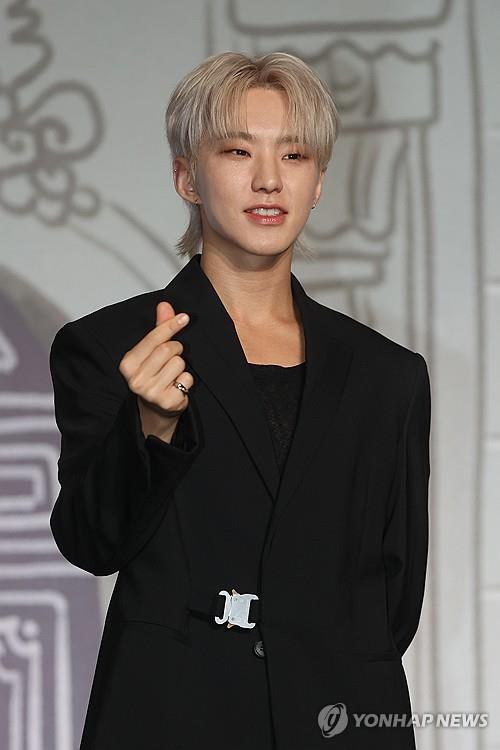SEVENTEEN member Hoshi officially began active duty in the Republic of Korea Army on September 16, 2025.
On the day he enlisted, he surprised fans by releasing a new single, "TAKE A SHOT," as a parting gesture.
Hoshi is the fourth member of SEVENTEEN to start military service, and he also made a charitable donation at the same time.
His agency asked fans to refrain from visiting the enlistment site and encouraged support through online channels instead.
“Enlistment, Farewell and a Promise” — Questions Raised by Hoshi’s Active Duty Choice
The situation is clear.
On September 16, 2025, Hoshi announced he would enter mandatory military service as an active-duty soldier.
He used the enlistment day to share a new song with fans, turning a private milestone into a public farewell.
Meanwhile, this choice can also be read as a deliberate way to keep a connection with fandom even during military service.
Fans felt a mix of comfort and regret when the news and the single were released together.
However, the agency’s request that supporters avoid in-person visits reflects both public health considerations and efforts to keep order at the site.
Therefore, the appeal to online cheering is presented as a measure that favors fan safety above spectacle.
Putting the background in context.
South Korea requires military service for most men aged 18 and older; conscription (mandatory military service) is a legal obligation rather than a personal choice.
Entertainers are not exempt, and celebrity enlistments become national moments that draw media attention.
SEVENTEEN debuted in 2015 and has been building a group identity since then. Sequential enlistments among members mark an important turning point for any large ensemble.
On the other hand, when several members serve one after another, it becomes difficult to schedule full-group activities.
Therefore, agencies and fandoms must rethink promotion plans, touring schedules, and content pacing.
Releasing a song or making a donation before enlistment has become a common practice. Such gestures serve two functions: they maintain an emotional link with fans and also demonstrate public-minded behavior.
The pro-enlistment argument.
Completing military service is widely regarded as meeting a civic obligation and can reinforce public trust.
When a public figure serves, it can be framed as a model of responsibility for younger audiences.
From this perspective, Hoshi’s decision to serve actively earns positive appraisal.
Furthermore, releasing new music on enlistment day shifts the narrative from abrupt absence to continued conversation.
It turns farewell into a creative moment and can strengthen fans’ sense of belonging.
In addition, reports that Hoshi donated 100 million won (roughly $75,000) at the time of enlistment were praised as an act of social contribution.
Donations from celebrities do more than provide money; they carry a public message.
Such acts can channel attention to causes and offer a tangible demonstration of values.
Proponents therefore see Hoshi’s choices as combining duty with generosity.

Concerns from the other side.
Most immediately, the gap created by military service is a practical burden for group management.
In a large group like SEVENTEEN, a member’s absence affects choreography, vocal arrangements, and tour planning.
As a result, the company may face fewer performance options and reduced promotional revenue.
Meanwhile, fans may experience real emotional strain.
Missing a favored artist can produce sadness and anxiety; some fans report feeling a loss that affects daily moods.
On the web, that anguish can spur heated arguments or unproductive speculation within the fandom.
Timing and communication are also points of friction.
Enlisting during the Chuseok holiday period limited opportunities for in-person farewell events, and some fans criticized the scheduling.
Therefore, critics argue that the way the enlistment was handled could have used more coordination with fans and clearer messaging.
Health and safety issues.
Physical injury or health problems during military training are a common fear among supporters.
For performers whose careers rely on their bodies, any damage can have long-term consequences for work after service.
Thus, preventive care and monitoring before, during, and after service are crucial concerns.
On the other hand, mental health and adaptation to strict communal life can be equally challenging.
Some entertainers may struggle with discipline, sleep disruption, or separation stress, which could require ongoing treatment.
Consequently, fans often ask for transparent updates about service members’ wellbeing, while respecting privacy boundaries.
Weighing the two sides.
Supporters stress that fulfilling military duty demonstrates social responsibility.
They point to the enlistment-day single and the donation as signs of consideration for both fans and society.
This view combines institutional expectation with an individual’s moral choice.
Conversely, critics emphasize loss of momentum and uncertainty about post-service careers.
Group activity slowdowns can affect the company’s business model and a member’s trajectory.
Therefore, reasonable anxiety about planning and career continuity is understandable.
In comparison to other countries, some nations either lack mandatory service or offer alternative forms of service that can coexist with an entertainment career.
However, South Korea’s current system leaves little room for extended exceptions, which makes these enlistments particularly consequential.

Strategic takeaways.
Agencies should present clearer road maps for pre-enlistment and post-enlistment activities.
For example, a schedule for digital releases, sub-unit projects, or solo promotions can reduce the impact of a member’s absence.
Meanwhile, long-term plans for medical and psychological support should be standard.
Fans, meanwhile, may need to adjust emotional expectations while keeping supportive rituals alive.
Rather than waiting only for a full-group comeback, fandoms can focus on steady content and reunion plans.
Community managers should also work to prevent internal disputes and keep conversations constructive.
Return and what comes next.
Timing and intensity of post-service activity depend on an individual’s health, the company’s strategy, and market demand.
Therefore, multiple comeback scenarios should be developed in advance.
Examples include staggered releases, solo work, or scaled tours that account for gradual reintegration.
Fans can help by supporting intermediate content such as archived footage, special livestreams, or individual projects.
These activities keep interest alive and ease the transition back to full activities.
Ultimately, a return is more likely to be a process of reinvention than a simple restart.
Broader social context.
An entertainer’s military service becomes public discourse because it sits at the intersection of cultural industry and national policy.
Thus, evaluating these events requires multiple viewpoints rather than a single emotional response.
Policy discussions about conscription and entertainment deserve careful, evidence-based debate.
Policy change would need broad social agreement and careful study.
Meanwhile, conversations that mix feeling and fact are most productive when they keep institutional realities and cultural impacts in balance.
Conclusion.
Hoshi’s choice shows both a commitment to social duty and a continuing promise to his fans.
Supporters praise the duty and the public-minded acts, while critics point to activity gaps and uncertainty.
Both sides raise valid points, and the main lesson is the need for careful, ongoing management.
The immediate takeaways are straightforward.
First, military service should be respected as a social institution.
Second, companies and fandoms must prepare realistic strategies to reduce gaps and protect artists’ futures.
Finally, a question for readers:
What more should agencies, artists, or fans do to prepare for an idol’s enlistment and eventual return?